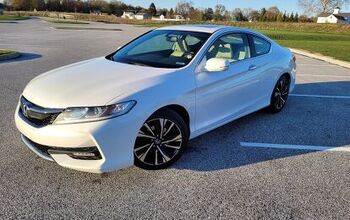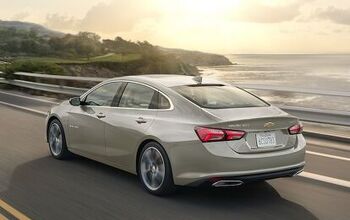Infiniti at 30: Special Editions and Uncertainty

As it blows out the candles on its 30th birthday cake, Infiniti’s biggest problems aren’t rocks and trees, but sales. That, and a shaky financial foundation underpinning its parent’s house.
Unlike in 1989, when the fledgling premium brand tempted buyers to pick up a new Q45, um, sight unseen, Infiniti is doing all it can to draw pairs of eyes to its real, physical vehicles, launching an Edition 30 trim package to mark the anniversary.
What does Edition 30 bring to the table? Standard safety features and blacked-out trim pieces, mainly. On the Q50, Q60, QX50, QX60, and QX80, ticking the birthday box brings a slew of driver-assist niceties to the table, among them Intelligent Cruise Control, Distance Control Assist, Around View Monitor, Backup Collision Intervention, and Predictive Forward Collision Warning.
Normally, one would need to spring for the optional ProAssist package to bring these onboard. Added to these electronic saviors are a black chrome grille surround, fender trim, side-view mirrors, rear finisher, and dark-finish wheels.
Everything else remains the same. On sale this fall, the Edition 30 crop will tempt buyers at the end of a year that promises to be even worse than the last. The Infiniti brand pushed itself to a post-recession high water mark in 2017, unloading 153,415 vehicles in the U.S. and capping off six consecutive years of sales growth. Considering the brand had dwindled into five-figure territory by 2011, this was an achievement in itself.
And yet momentum stalled as the industry cooled off. Infiniti’s current rate of contraction outpaces that of the industry. While the decline from 2017 to 2018 came in at 2.7 percent, sales though the end of July show a year-to-date loss of 12.5 percent. Vehicles like the recently revamped QX50 remain in the red (QX50 sales fell 2.3 percent, year to date), while passenger car volume is down 29.9 percent thus far in 2019. Its utility vehicle lineup posted a 2.5 percent drop.
The only vehicle showing consistent gains is the flagship QX80, refreshed for 2019, which saw its popularity rise 18 percent this year. Luckily for Infiniti, that’s a vehicle with beefy margins.
As Nissan struggles to overcome its financial slump, all the while resisting the urge to boost incentives, Infiniti finds itself with a stable of mostly shrinking models and a future steeped in uncertainty. Come 2021, all new Infiniti models will be electrified in one way or another — hybrids, including Nissan’s novel e-Power system, and pure electrics, the latter crop heralded by a procession of concept cars numerous enough to risk spreading confusion. Ominously, one broke down before reaching the stage at this year’s Detroit auto show.
America’s appetite for EVs is no sure thing, and potential demand for an electric Infiniti has to take the popularity of present-day models into account, at least to some degree. Earlier this year, Infiniti pulled out of Europe after failing to ignite a spark.
The road carrying Infiniti into the future lies under stormy skies.
[Images: Infiniti]

More by Steph Willems
Latest Car Reviews
Read moreLatest Product Reviews
Read moreRecent Comments
- Varezhka I have still yet to see a Malibu on the road that didn't have a rental sticker. So yeah, GM probably lost money on every one they sold but kept it to boost their CAFE numbers.I'm personally happy that I no longer have to dread being "upgraded" to a Maxima or a Malibu anymore. And thankfully Altima is also on its way out.
- Tassos Under incompetent, affirmative action hire Mary Barra, GM has been shooting itself in the foot on a daily basis.Whether the Malibu cancellation has been one of these shootings is NOT obvious at all.GM should be run as a PROFITABLE BUSINESS and NOT as an outfit that satisfies everybody and his mother in law's pet preferences.IF the Malibu was UNPROFITABLE, it SHOULD be canceled.More generally, if its SEGMENT is Unprofitable, and HALF the makers cancel their midsize sedans, not only will it lead to the SURVIVAL OF THE FITTEST ones, but the survivors will obviously be more profitable if the LOSERS were kept being produced and the SMALL PIE of midsize sedans would yield slim pickings for every participant.SO NO, I APPROVE of the demise of the unprofitable Malibu, and hope Nissan does the same to the Altima, Hyundai with the SOnata, Mazda with the Mazda 6, and as many others as it takes to make the REMAINING players, like the Excellent, sporty Accord and the Bulletproof Reliable, cheap to maintain CAMRY, more profitable and affordable.
- GregLocock Car companies can only really sell cars that people who are new car buyers will pay a profitable price for. As it turns out fewer and fewer new car buyers want sedans. Large sedans can be nice to drive, certainly, but the number of new car buyers (the only ones that matter in this discussion) are prepared to sacrifice steering and handling for more obvious things like passenger and cargo space, or even some attempt at off roading. We know US new car buyers don't really care about handling because they fell for FWD in large cars.
- Slavuta Why is everybody sweating? Like sedans? - go buy one. Better - 2. Let CRV/RAV rust on the dealer lot. I have 3 sedans on the driveway. My neighbor - 2. Neighbors on each of our other side - 8 SUVs.
- Theflyersfan With sedans, especially, I wonder how many of those sales are to rental fleets. With the exception of the Civic and Accord, there are still rows of sedans mixed in with the RAV4s at every airport rental lot. I doubt the breakdown in sales is publicly published, so who knows... GM isn't out of the sedan business - Cadillac exists and I can't believe I'm typing this but they are actually decent - and I think they are making a huge mistake, especially if there's an extended oil price hike (cough...Iran...cough) and people want smaller and hybrids. But if one is only tied to the quarterly shareholder reports and not trends and the big picture, bad decisions like this get made.


































Comments
Join the conversation
I was looking for a new car last year, I wanted a RWD coupe or sedan that wasn't ugly or boring. Infiniti didn't even warrant a trip to a dealer for me. They're ugly and boring. Even the Redline. I bough a heavily discounted Kia Stinger, it's flashier than I wanted but it's fun and comfortable.
My prediction is that the Infiniti brand will not survive the next economic downturn in the U.S. Honda should use the excuse of a recession to put Acura out to pasture, too. I have always felt the majority of Honda resents the Acura brand and sabotages it, hoping it fails. Doesn't help that I thought I saw a new RDX in profile in a parking lot the other day. Oops, turns out it was an HR-V. Same low-end design language. Styling-wise Acuras do not look like they are worth even half of their MSRPs. If either of these brands closes up shop, there's a built-in network of dealership facilities for Genesis to slide into. Sounds crazy, but remember the changes we saw during the last Great Auto Reckoning in 2008.